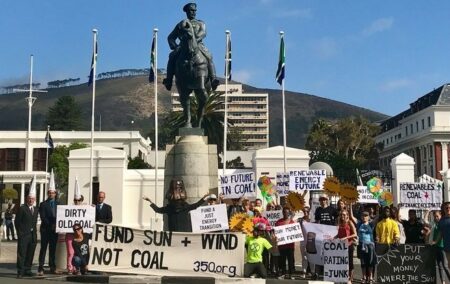Outside parliament before the budget speech, I saw protesters chanting loudly and bearing posters that read: ‘Fight mass unemployment!’, ‘Demand million climate jobs!’, ‘Unite for a living income grant!’ (at R12 500 a month, I believe), ‘Retrench bosses not workers!’, and ‘Increase sugary drinks tax now!’
SAFM radio had asked me to be part of a panel discussing the budget beforehand. With me was an economist, a tax expert, labour journalist Terry Bell, an IFP MP who works on SCOPA and a man from the Ministry of Health to discuss NHI. I was to discuss energy.
Apart from the NHI man, whom nobody believed for an instant, the rest of us seemed in agreement about the desperate state of the economy and the reasons for it – the hopeless failure of the ANC government. Terry Bell is a socialist, if not a communist, and I believe in capitalism, so I expected a clash between us. There was none. Overriding our ideological differences was our common distress at the corruption and incompetence of our political leaders, and the complete lack of political will to implement solutions obvious to everyone.
On energy and Eskom, I managed to get in my usual points. The ANC had wrecked Eskom, whose power stations are failing and which now has more debt than it can repay. I said it must improve its maintenance, shed its dreadful BEE coal procurement and get rid of half of its staff (the bureaucrats and managers not the engineers and artisans). These obvious measures need political will, which is lacking. I said anybody should be allowed to provide electricity for own use or to municipalities or the grid, provided only that this meets technical regulation requirements and is sold in a competitive market. I warned against the wide expectations that ‘renewable’ energy is a magic pill that will solve all of our electricity problems. (It will probably help with off-grid electricity, but worsen the problems for grid electricity – because of the high costs of accommodating the unreliable renewables into the grid.)
No political will
Repayment of debt, social grants and the public sector wage bill now use over 70% of total revenue. This is ruinous. The social grants cannot be reduced (they were slightly increased) but the public sector certainly can. There is no political will to do so. Terry Bell pointed out there were actually shortages of staff in parts of the public sector, such as nursing and teaching. He wanted to cut the number of ministers and senior civil servants, who all earn huge wages. But how do you get a minister to cut ministers? How do you get a bureaucrat to reduce the bureaucracy? In the budget itself, Tito Mboweni proposed a modest plan to reduce the public wage bill by R160 billion ‘over the medium term’. This rather feeble suggestion was met with thunderous outrage from the unions. Our tax expert predicted sadly that Mboweni probably had no option but to increase VAT. Mboweni did not do so.
Looming over our whole economy, indeed our whole country, is our catastrophic unemployment, now approaching 40% if you include those who have given up looking for work. This can only be cured by high economic growth, which means a booming private sector and more capitalism, which means freeing up the economy. But the ANC hates capitalism. Mboweni proposed some vague and unconvincing initiatives to increase jobs. (Where have we heard this before?). He spoke about the need to lower the costs of doing business in South Africa. But the ANC hates business and has passed extensive legislation to make the costs of doing business as high as possible. Mboweni is a prime culprit here, since his awful Labour Relations Act, passed when he was Minister of Labour, has probably done more than any other single measure to increase unemployment and raise costs for business.
Gloomy future
It was a skilful and cautious budget but did not tackle any of our biggest problems, and this was simply because of lack of political will. Mboweni should have announced the liquidation of SAA (which I think he favours) but did not have the will to do so. So we crawl miserably toward a gloomy future.
Yet, strangely enough, I felt somewhat cheered when it was all over. This was because of the good sense I heard all around me, and the common agreement on what our problems were – with even some agreement on how to solve them. In parliament itself, the ruling politicians were evading reality in their usual way; in the street outside, the protesters were shouting their usual inane demands (as is their democratic right); but in the SABC press tent, I heard sober and thoughtful comment from all. Their reasoned pessimism encouraged me. Our chair, Sakina Kamwenda of the SABC, was a marvel of skill, charm, fairness and intelligence.
[Picture: Tariro Washinyira, GroundUp]
The views of the writer are not necessarily the views of the Daily Friend or the IRR
If you like what you have just read, become a Friend of the IRR if you aren’t already one by SMSing your name to 32823 or clicking here. Each SMS costs R1. Terms & Conditions Apply.

